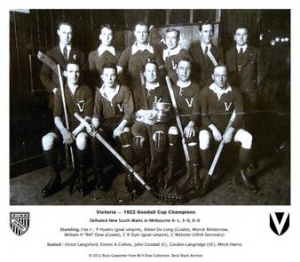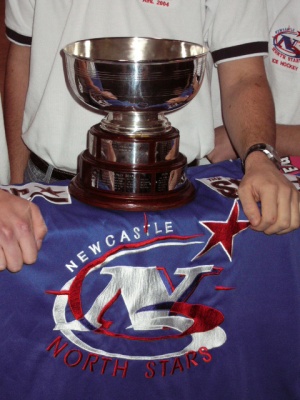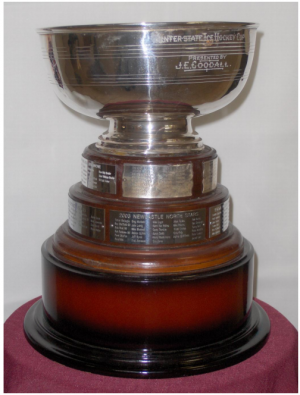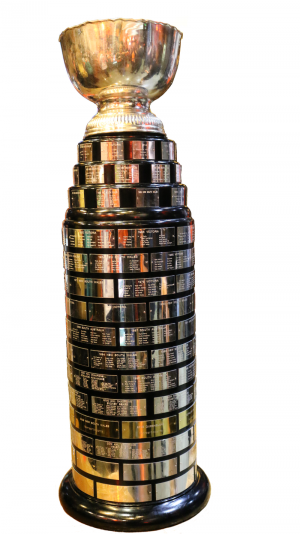Goodall Cup
 | |
| Established | 1909 |
|---|---|
| Current holder(s) | Newcastle North Stars |
| Awarded to the | Playoff champion of the Australian Ice Hockey League |
main
The Goodall Cup is the annually awarded championship trophy, of the Australian Ice Hockey League (AIHL), to the winner of the AIHL finals. Originally donated in 1909 the trophy is named after Australian born player John Edwin Goodall.[1] The cup is instantly recognisable by the distinct single gold band of plaques around the lower portion of the trophy. The trophy has continued to be contested as the national senior men's ice hockey trophy in Australia, making it the fifth oldest known ice hockey trophy still being awarded, after the Stanley Cup (1892; NHL Championship Cup), the Queen's Cup (1903; Ontario University Championship Cup), the Boyle Cup (1904; previously Newfoundland Senior Men's Cup and now Newfoundland High School Championship Cup), and the Allan Cup (1908; Canadian Senior Men's Amateur Championship Cup).
The original Goodall Cup is made of pewter and mounted on a wooden base. Inscribed on the bowl of the cup are the words: "Inter-State Hockey Cup Presented by J.E. Goodall"
There are two versions of the Goodall Cup: The "Original Cup" that now resides in the Hockey Hall of Fame in Toronto, Ontario and the "Replica Cup" that is currently used for presentations and is awarded to the players upon becoming the AIHL finals champions.
The Goodall Cup was traditionally an inter-state tournament, before it was incorporated into the Australian Ice Hockey League in 2002. New South Wales and Victoria were the original competitors and, between them, held the trophy until 1977 when Queensland won the cup.
The Goodall Cup has been competed for annually since 1909 with the following exceptions: 1914-1920 World War I, 1940-1946 (World War II), 1955-1960 (closure of the Sydney Glaciarium) and 1993.
History
The Beginning
The beginnings of ice sports in Australia are traced back to the evening of Wednesday October 12, 1904[2] during a carnival held at the Adelaide Glaciarium, the first ice rink built in Australia.
This important location for Australian ice sports began as a Cyclorama, which opened on Friday 28 November 1890 at 89 Hindley Street, Adelaide. On the evening of Tuesday September 6th 1904, the building was reopened after being remodeled by a new group called the Ice Palace Skating Company, owned by H. Newman Reid and referred to as the Glaciarium or Ice Palace Skating Rink.[3]
On the evening of Wednesday October 12 1904 a match for what was called "hockey on the ice" was held during the carnival at the Adelaide Glaciarium. This game was not ice hockey, it was an adaption of roller polo to the ice using ice skates instead of roller skates.[3]
To-night a novelty in the shape of a hockey match on ice between a team from the rink and a team picked from the visitors will be presented at the Glaciarium, and this should be the prelude to a series of sports and carnival festivities which will enhance the attractions of the rink, both for skaters and the general public. The management have decided on Saturday morning next to admit children under 10 free, only charging sixpence for floorage and skates.[3]
At the time this version of roller polo adapted to the ice was being played in Adelaide, ice hockey was already a well established sport and had been codified for almost 30 years. Though it was being called "hockey on the ice", it was not ice hockey.
The beginnings of ice sports in Australia can be linked to the Glaciarium in Adelaide but the birth place of ice hockey in Australia was in Melbourne, Victoria and was the first time ice hockey had been played. Organised games of ice hockey in Australia began with the opening of the Melbourne Glaciarium on the afternoon of June 9, 1906,[4] at 16 City Road, South Melbourne Victoria.[5]
The first recorded organised game of ice hockey in Australia was on July 12, 1906 and was between a Victorian representative team and the American sailors from the visiting American Warship the USS Baltimore. This game was held in the Melbourne Glaciarium The result of this game was a 1-1 tie.[2]
Club level ice hockey in Australia began with 4 original teams, forming the Victorian Ice Hockey Association (VIHA) in 1908:[6]
- Beavers
- Brighton
- Glaciarium
- Melburnians
New South Wales was represented by a newly formed team in 1909 and traveled to Melbourne which marked the first national interstate competition for senior mens hockey in Australia.[7] This was the year that 16-year-old John Edwin Goodall donated the J. E. Goodall Cup to the interstate series, the Victoria state team won the inaugural tournament to become the first Goodall Cup Champions, with Robert Jackson as the captain.
In 1910, Victoria traveled up to the Sydney Glaciarium and among the Victorian players to make the trip was 17-year-old John Edwin Goodall, who had donated the trophy for the previous years interstate tournament. Victoria defeated the New South Wales team and was again the Goodall Cup Champions for the second year in a row[7]
New South Wales would come back to win the Goodall Cup against Victoria in the following 2 years, 1911 and 1912.[7]
The Victoria State team would defeat the New South Wales state team to regain the Goodall Cup in 1913, the last interstate series held before World War I.[7]
After The Great War

New South Wales and Victoria would not play again until 1921 as World War I forced the closure of the Sydney rink (which reopened in 1920) and the abandonment of the 1914 season. New South Wales won the 1921 series with a far superior lineup which included Canadian Jimmy Kendall, who had previously turned down a cadetship with the Montreal Professional Club. This also marked the same year that the first protective hockey equipment arrived from Canada.[7]
In 1922 the Victorians, captained by John Edwin Goodall, won back the Goodall Cup in what was considered an upset. It was the last time the Victorians won the Cup until 1947, and the last time John Edwin Goodall would be part of a team that won the cup that he had donated in 1909.[7]
1923-1931 AIHA
In 1923 a national federation formed and was named the Australian Ice Hockey Association (AIHA). John Edwin Goodall became the first elected president and A. De Long became the first elected Secretary/ Treasurer.[7] The Goodall Cup would become the trophy awarded to the inter state championship.
The New South Wales State team would win every Goodall Cup in the 9 years of the national federation being called the Australian Ice Hockey Association (AIHA) from 1923 to 1931.[7]
1932-1937 AIHSSC
In the year of 1932 the Australian Ice Hockey Association (AIHA) was renamed the Australian Ice Hockey and Speed Skating Council (AIHSSC) and the Goodall Cup would remain the awarded championship trophy for the national competition. The New South Wales State team would win every cup for the 6 years that the national federation went under this name from 1932 to 1937,[7] by winning all but the series in 1932 that resulted in a tied series.[8]
1938 AIHF and joining the IIHF
In the year 1938, the Australian Ice Hockey Association (AIHA) was renamed the Australian Ice Hockey Federation (AIHF) and became part of the International Ice Hockey Federation (IIHF). The Goodall Cup would continue being the awarded trophy for champions of the national competition that remained between Victoria and New South Wales.[7]
New South Wales would win the Goodall Cup in 1938 and 1939 before the national competition was interrupted in 1940 by the events of World War II.[7]
After World War II
In 1946, the national competition recommenced[7] and the series was hosted by Victoria at the St Moritz Ice Rink located in St. Kilda, Victoria.
A record crowd of 5000 people saw the final game of the series on Wednesday August 7, 1946, which resulted in a tie game and a tied series.[9] This tied series resulted in the New South Wales state team retaining the Goodall Cup for 1946 due to having been the previous champions in 1939 before World War II interrupted the competition.
The Goodall Cup was not contested from 1956 to 1960, where 1956 saw the Sydney Claciarium close down and in 1957 the Melbourne Glaciarium close down, making it the longest operating rink at 50 years.[10]
In 1977 the Queensland state team won its first Goodall Cup and this was the first time a state team other than Victoria or New South Wales had won the championship before.[7]
In 1986 the South Australia state team won their first Goodall Cup and were the only state other than Victoria and New South Wales to win a Goodall Cup Since Queensland had won in 1977. South Australia also won the Goodall Cup again in 1987.[7]
In 1993, the Goodall Cup was not played for.[7]
In 1998 The Australian Capital Territory won their first Goodall Cup.[7]
2002-2008 AIHL
The AIHL was formed in the year 2000 and consisted of 3 teams: Adelaide Avalanche, Sydney Bears and Canberra Knights.
In 2002, The AIHL expanded from 3 teams to 6 teams with the inclusion of Melbourne Ice, Newcastle North Stars and West Sydney Ice Dogs. The Australian Ice Hockey Federation (AIHF) adopted the official business name Ice Hockey Australia (IHA) and the Goodall Cup was transferred from the IHA interstate championship to the AIHL and became the trophy given to the winners of the finals series for the newly formed AIHL.[7]
The Sydney Bears won the first AIHL Goodall Cup in 2002 in a finals series hosted at the Sydney based Blacktown Ice Arena where they defeated the Adelaide Avalanche.[11]
Celebrating 100 years
The Goodall Cup was withdrawn from the AIHL in 2009 by the cup's custodians, Ice Hockey Australia (IHA). It was instead awarded to South Australia in a traditional state vs state tournament held in Adelaide, South Australia in October 2009 as a 100 year celebration of the Goodall Cup.[12]
To mark the centenary championship, a single band of gold plaques circles the trophy with each containing the name of each State Team. Those teams that did not participate in the centenary final match have the words "Non-participants" under the state name.
The original Goodall Cup was retired before the centenary finals and now resides in the Hockey Hall of Fame, Toronto, Ontario Canada. A "Replica Cup" was made for use in the 2009 centenary finals and was the version of the cup that was awarded to the Adelaide state team.
2010-present AIHL
In 2010 the Goodall Cup was offered back to the AIHL, and the cup was accepted by a vote of the members and board. The Goodall Cup has been re-instated by the AIHL as its finals tournament trophy and as the prize signifying Australian champions of ice hockey. Adelaide Adrenaline, winners of the 2009 AIHL playoff were engraved into the cup and are also known as the 2009 Goodall Cup champions.[13]
Traditions and Cup History
Tied Series
There are two different years where the interstate championship series resulted in a tied series, seeing the Goodall Cup being retained by the previous years winner rather than actually awarded to a champion of the series. These years have been incorrectly recorded as a win in many references to these particular series as well as being inscribed on the Goodall Cup as being victories.
1932
Wednesday August 3, 1932 was the final game of the three game series between Victoria and New South Wales and resulted in a win for Victoria to tie the series.[14]
1946
This series was hosted at the St Moritz Ice Rink located in St. Kilda, Victoria. The last game of the series was held on Wednesday August 7, 1946 and saw a record crowd of 5000 people at the venue.[9] This tied series resulted in the New South Wales state team retaining the Goodall Cup for 1946 due to having been the previous champions in 1939 before World War II interrupted the competition.
Original and Replica versions
There are technically two versions of the Goodall Cup championship trophy: the "Original Cup", and the "Replica Cup".
Original Cup
The 1909 "Original Cup" was named after John Edwin Goodall and first awarded to Victoria after they defeated New South Wales 6-1 on Saturday, September 4, 1909 to win the finals series 2-1.[15] The original cup is made of pewter and was mounted on a wooden base. Inscribed on the bowl of the original cup are the words: "Inter-State Hockey Cup Presented by J.E. Goodall"
The cup was partially restored in 2004 by the champions at the time, the Newcastle North Stars where the pewter cup was polished and the original wooden single tier mount was replaced with a 2 tier wooden mount.
A 3rd larger redwood tier was added to the trophy between the 2004 restoration works and the 2009 large barrel was added.
Mid way through 2009, the cup was again restored and mounted on a large barrel-like base covered in name plates to be ready for the centenary game. This is the cups current form. This final version of the trophy was retired from being awarded to the players in 2009 and it now resides in the Hockey Hall of Fame in Toronto, Ontario, Canada.[16]
Replica Cup
The Federation agreed to the purchase of a replica Goodall Cup in March 2009 after the "Original Cup" was considered too precious to continue traveling. The "Replica Cup" was created in 2009 and was to be used at all national championships and state association events.[16]
The replica cup was first awarded in 2009 to the Adelaide state team in the centenary game.
Inscribed on the bowl of the "Replica Cup" are the words: "Inter-State Hockey Cup Presented by J.E. Goodall", like the original cup.
Winners of the Goodall Cup
|
|
|
References
General
- Championship & League Winners - Australia at A to Z Encyclopaedia of Ice Hockey
Specific
- ↑ http://icelegendsaustralia.com/1stIceChampions-builders2.html#Goodall
- ↑ 2.0 2.1 "The History of Australian Ice Hockey". Australian Ice Hockey Federation - the official website. http://www.iha.org.au/files/uploaded_documents/379/IHA_History_%2804.03.12%29.pdf. Retrieved 26 February 2015.
- ↑ 3.0 3.1 3.2 "The Cyclorama". State Library of South Australia. http://guides.slsa.sa.gov.au/content.php?pid=444071&sid=3636668. Retrieved 15 March 2015. Cite error: Invalid
<ref>tag; name "slsa.sa.gov.au" defined multiple times with different content Cite error: Invalid<ref>tag; name "slsa.sa.gov.au" defined multiple times with different content - ↑ "The "Glaciarium"". The Argus - The "Glaciarium". http://trove.nla.gov.au/ndp/del/article/10048469. Retrieved 28 February 2015.
- ↑ "The Glaciarium, 16 City Road, South Melbourne". Harold Paynting Collection, State Library of Victoria. - The Glaciarium, 16 City Road, South Melbourne. http://digital.slv.vic.gov.au/view/action/nmets.do?DOCCHOICE=336734.xml&dvs=1425054652600~826&locale=en_US&search_terms=&adjacency=&divType=&usePid1=true&usePid2=true. Retrieved 28 February 2015.
- ↑ "Jack Carpenter's Victoria A Brief History of Ice Time". Legends of Australian Ice - Jack Carpenter's Victoria A Brief History of Ice Time. http://icelegendsaustralia.com/1stIceChampions-builders.html. Retrieved 28 February 2015.
- ↑ 7.00 7.01 7.02 7.03 7.04 7.05 7.06 7.07 7.08 7.09 7.10 7.11 7.12 7.13 7.14 7.15 7.16 "The History of Australian Ice Hockey". Australian Ice Hockey Federation - the official website. http://www.iha.org.au/files/uploaded_documents/379/IHA_History_%2804.03.12%29.pdf. Retrieved 28 February 2015.
- ↑ "Time Interstate Match Drawn". Legends of Australian Ice - the official website. http://icelegendsaustralia.com/darkmatter/pages/time.html. Retrieved 28 February 2015.
- ↑ 9.0 9.1 "Goodall 1946". Legends of Australian Ice - the official website. http://icelegendsaustralia.com/darkmatter/images/Goodall-1946.jpg. Retrieved 28 February 2015.
- ↑ "Time". Legends of Australian Ice - the official website. http://icelegendsaustralia.com/darkmatter/pages/time.html#l. Retrieved 28 February 2015.
- ↑ "2002 AIHL Season". Public wiki. https://en.wikipedia.org/wiki/2002_AIHL_season. Retrieved 28 February 2015.
- ↑ "Goodall Cup 2009". Ice Hockey Australia. Archived from the original on 2010-04-08. http://goodall.stats.pointstreak.com/standings.html?leagueid=847&seasonid=4915. Retrieved 2010-04-08.
- ↑ Lambert, Peter (2010-03-31). "AIHL Welcomes Back Goodall Cup". Australian Ice Hockey League. Archived from the original on 2010-04-13. http://www.theaihl.com/leagues/newsletter.cfm?clientID=3856&leagueID=11464&page=43763. Retrieved 2010-04-13.
- ↑ "Goodall 1932". Legends of Australian Ice - the official website. http://icelegendsaustralia.com/darkmatter/images/Goodall-1932.jpg. Retrieved 28 February 2015.
- ↑ "Birth of the Grail". Ice Legends Australia. http://icelegendsaustralia.com/darkmatter/pages/time.html.
- ↑ 16.0 16.1 "History of the Australian Ice Hockey League". Australian Ice Hockey League. http://www.theaihl.com/leagues/custom_page.cfm?clientid=3856&leagueid=11464&pageid=10074. Cite error: Invalid
<ref>tag; name "History of the Australian Ice Hockey League" defined multiple times with different content
| Goodall Cup |
|---|
| 1909 - 1910 - 1911 - 1912 - 1913 - 1921 - 1922 - 1923 - 1924 - 1925 - 1926 - 1927 - 1928 - 1929 - 1930 - 1931 - 1932 - 1933 - 1934 - 1935 - 1936 - 1937 - 1938 - 1939 - 1946 - 1947 - 1948 - 1949 - 1950 - 1951 - 1952 - 1953 - 1954 - 1955 - 1961 - 1962 - 1963 - 1964 - 1965 - 1966 - 1967 - 1968 - 1969 - 1970 - 1971 - 1972 - 1973 - 1974 - 1975 - 1976 - 1977 - 1978 - 1979 - 1980 - 1981 - 1982 - 1983 - 1984 - 1985 - 1986 - 1987 - 1988 - 1989 - 1990 - 1991 - 1992 - 1994 - 1995 - 1996 - 1997 - 1998 - 1999 - 2000 - 2001 - 2002 - 2003 - 2004 - 2005 - 2006 - 2007 - 2008 - 2009 - 2010 - 2011 - 2012 - 2013 - 2014 - 2015 - 2016 |
| This page uses Creative Commons Licensed content from Wikipedia (view authors). |


